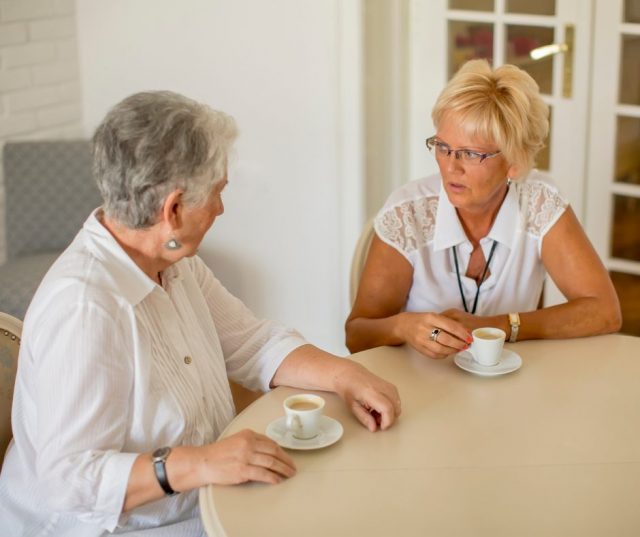Choosing the “right time” for a loved one to make the move into more supportive care can be difficult. The journey into residential Aged Care is different for everyone and can be emotionally fraught without the right information. Below we have answered some common questions to help you navigate a move into Aged Care.

What is the right age for Aged Care?
In Australia, a person may qualify for a government-subsidised place in a residential Aged Care residence if they are over the age of 65 years (or over 50 years for people of Aboriginal or Torres Strait Islander descent) and cannot manage day-to-day tasks independently. The person’s age is not as important as their ability to look after themselves on an everyday basis.
When should an elderly person go into residential Aged Care?
There are some circumstances that may indicate that your loved one is ready to access a higher level of Aged Care support. These include:
- being unable to manage household tasks such as cooking, cleaning, and shopping independently
- being unable to manage personal care tasks such as dressing, showering, or toileting independently
- requiring modifications to the home to aid mobility
- experiencing memory loss or other symptoms that impact their ability to safely live independently
- having difficulty independently taking medication as prescribed or following the advice of medical professionals
- requiring more medical care and support than can be provided at home
In some instances, a person can receive support for these challenges in their own home However, it can be difficult sometimes to find an available home carer. Perhaps the need is urgent so it is not possible to find a home carer in time, or there is no friend or family member with the time to be a carer. It is also possible that your loved one requires more care than can be safely provided in their home. If any of these apply to your situation, a move to an Aged Care facility may be beneficial.
Who can make the decision about when to move into Aged Care?
Deciding when to go into Aged Care residence should involve the person needing care, their loved ones, and their primary health carer, such as their GP. If the person involved has the capacity to make the decision themselves, they must give their consent in order to move into an Aged Care facility. If the person has lost the capacity to consent to such a move, a GP or other qualified medical professional can make a recommendation and/or provide a referral to an Aged Care residence. This helps the person needing care or their enduring power of attorney to make the best decision.
How do I have a conversation with my loved one about moving into Aged Care?
The best time to start the conversation about when to go into Aged Care is well before the move is needed. Discuss with the person their preferences and ideas about the process, so that any fears can be allayed, and any questions asked and answered. Explore the benefits of round-the-clock support with your loved one and focus on the positives.
When it has not been possible to have the conversation early, and it has become suddenly necessary to discuss a move into an Aged Care residence, it is even more important to acknowledge your loved one’s position on the matter. Answer their questions, validate their emotions, and share information about any upcoming changes generously. Above all, be compassionate and patient. Moving into residential Aged Care is a big change for everyone involved, but it can be a positive one!

Can I still care for my relative if they go into Aged Care?
Yes, you can. You and your chosen Aged Care provider will be partners in supporting your loved one to have the best quality of life possible. You know your loved one best. You have important information about your loved one, their lifestyle, habits, and preferred activities that will assist the residence staff in providing individualised care.
How do I know my loved one will be properly looked after in residential Aged Care?
It is important that, before your loved one moves into residential Aged Care, you have explored your options to find the best fit. Work with your loved one to make a list of questions to ask the Aged Care provider. Some questions you might ask are:
- What are the rules around visitation? Can Aged Care residents go out?
- Can spouses stay together or close by in this facility?
- What types of rooms are available? Can my loved one move into a different room if needed?
- What kinds of activities and social opportunities are available?
- What costs are involved? What types of meals are available? How are dietary requirements provided for?
Making the decision on the right time to move into Aged Care can be daunting. Support and information are available online at the Carer Gateway and My Aged Care websites. TriCare Aged Care residences are also there to help you navigate questions about when to go into Aged Care. Book a tour or contact us today.




